Experiences and Challenges of Social Care Workers in Healthcare
VerifiedAdded on 2022/08/21
|7
|1490
|27
Report
AI Summary
This report delves into the experiences and challenges faced by social care workers supporting adults with intellectual disabilities. It begins with an introduction defining intellectual disability and its complexities within the healthcare setting, highlighting the unmet needs of this population and the skills required of social care workers. The report emphasizes the significance of understanding these challenges, particularly the lack of adequate training and support, and the impact on service delivery and the well-being of both service users and care providers. The literature review provides a summative overview of the research conducted in the field. The report also includes interview data from social care workers, detailing challenges such as staffing shortages, lack of support, aging service users with increasing needs, and the emotional and physical exhaustion associated with the role. The findings underscore the importance of addressing these issues to improve the quality of care and the working conditions of social care workers. The report concludes by emphasizing the need for further research and training to better support both the individuals with intellectual disabilities and the professionals who care for them.

Running head: HEALTHCARE
Healthcare
Name of the Student
Name of the University
Author Note
Healthcare
Name of the Student
Name of the University
Author Note
Paraphrase This Document
Need a fresh take? Get an instant paraphrase of this document with our AI Paraphraser
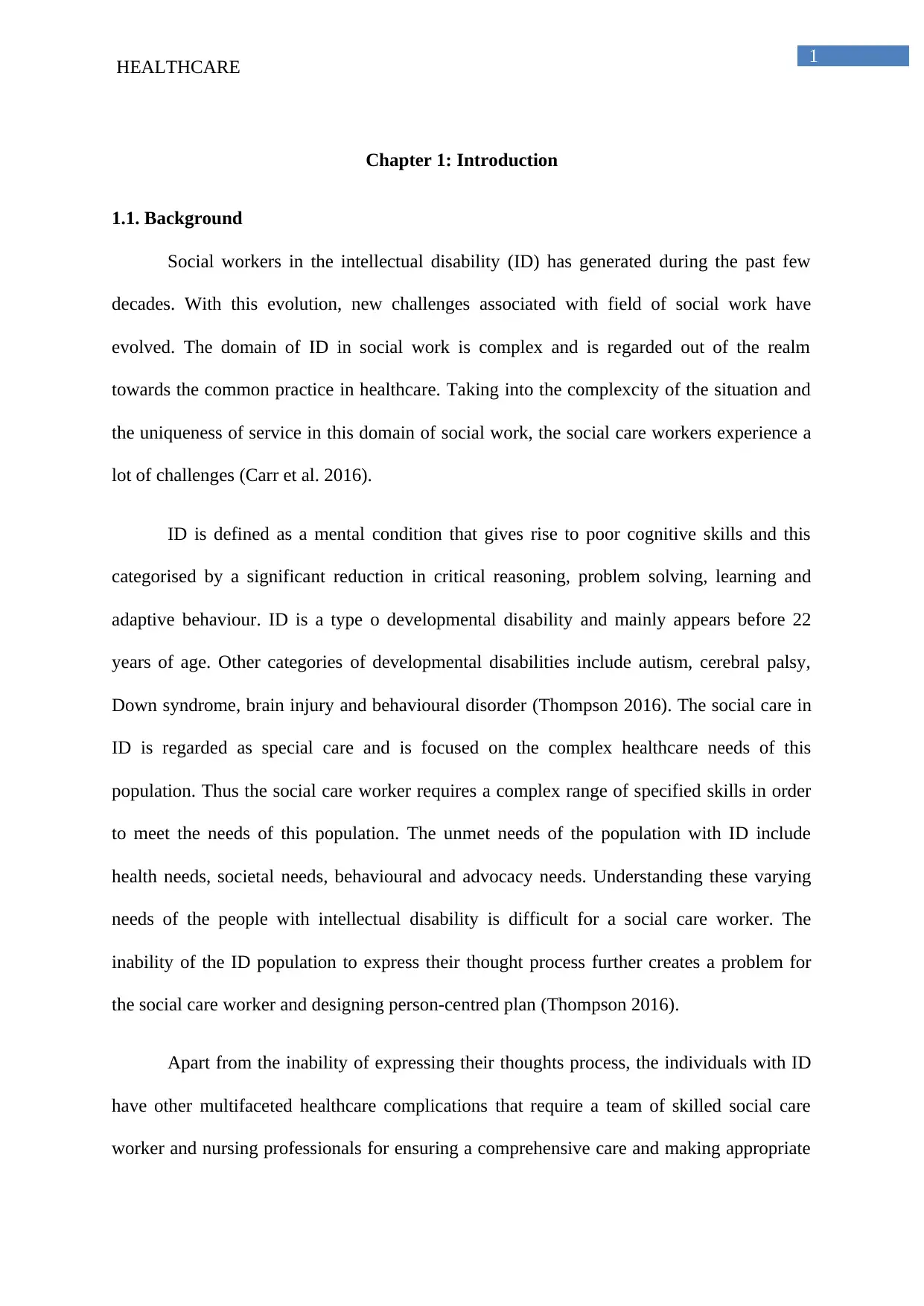
1
HEALTHCARE
Chapter 1: Introduction
1.1. Background
Social workers in the intellectual disability (ID) has generated during the past few
decades. With this evolution, new challenges associated with field of social work have
evolved. The domain of ID in social work is complex and is regarded out of the realm
towards the common practice in healthcare. Taking into the complexcity of the situation and
the uniqueness of service in this domain of social work, the social care workers experience a
lot of challenges (Carr et al. 2016).
ID is defined as a mental condition that gives rise to poor cognitive skills and this
categorised by a significant reduction in critical reasoning, problem solving, learning and
adaptive behaviour. ID is a type o developmental disability and mainly appears before 22
years of age. Other categories of developmental disabilities include autism, cerebral palsy,
Down syndrome, brain injury and behavioural disorder (Thompson 2016). The social care in
ID is regarded as special care and is focused on the complex healthcare needs of this
population. Thus the social care worker requires a complex range of specified skills in order
to meet the needs of this population. The unmet needs of the population with ID include
health needs, societal needs, behavioural and advocacy needs. Understanding these varying
needs of the people with intellectual disability is difficult for a social care worker. The
inability of the ID population to express their thought process further creates a problem for
the social care worker and designing person-centred plan (Thompson 2016).
Apart from the inability of expressing their thoughts process, the individuals with ID
have other multifaceted healthcare complications that require a team of skilled social care
worker and nursing professionals for ensuring a comprehensive care and making appropriate
HEALTHCARE
Chapter 1: Introduction
1.1. Background
Social workers in the intellectual disability (ID) has generated during the past few
decades. With this evolution, new challenges associated with field of social work have
evolved. The domain of ID in social work is complex and is regarded out of the realm
towards the common practice in healthcare. Taking into the complexcity of the situation and
the uniqueness of service in this domain of social work, the social care workers experience a
lot of challenges (Carr et al. 2016).
ID is defined as a mental condition that gives rise to poor cognitive skills and this
categorised by a significant reduction in critical reasoning, problem solving, learning and
adaptive behaviour. ID is a type o developmental disability and mainly appears before 22
years of age. Other categories of developmental disabilities include autism, cerebral palsy,
Down syndrome, brain injury and behavioural disorder (Thompson 2016). The social care in
ID is regarded as special care and is focused on the complex healthcare needs of this
population. Thus the social care worker requires a complex range of specified skills in order
to meet the needs of this population. The unmet needs of the population with ID include
health needs, societal needs, behavioural and advocacy needs. Understanding these varying
needs of the people with intellectual disability is difficult for a social care worker. The
inability of the ID population to express their thought process further creates a problem for
the social care worker and designing person-centred plan (Thompson 2016).
Apart from the inability of expressing their thoughts process, the individuals with ID
have other multifaceted healthcare complications that require a team of skilled social care
worker and nursing professionals for ensuring a comprehensive care and making appropriate
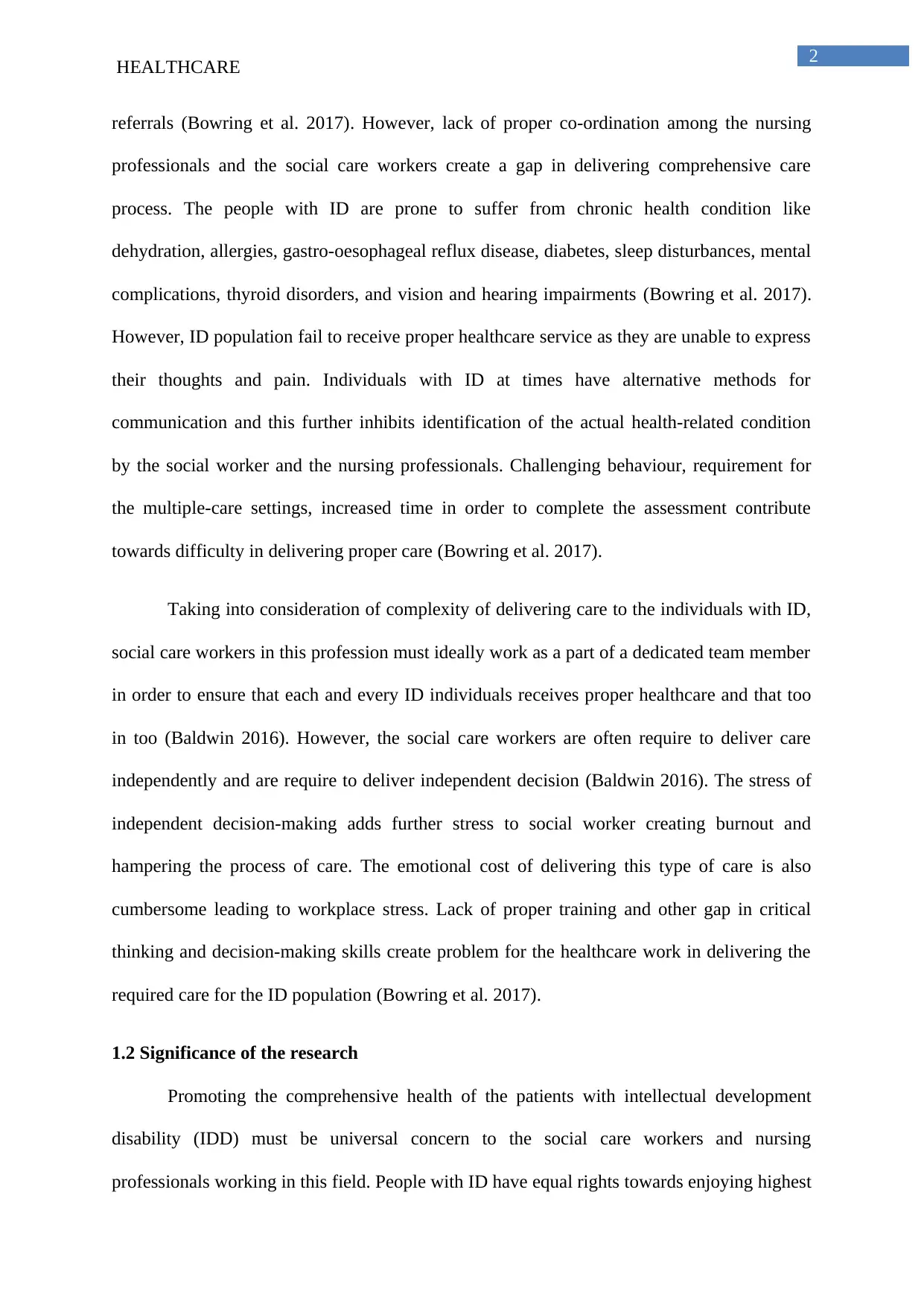
2
HEALTHCARE
referrals (Bowring et al. 2017). However, lack of proper co-ordination among the nursing
professionals and the social care workers create a gap in delivering comprehensive care
process. The people with ID are prone to suffer from chronic health condition like
dehydration, allergies, gastro-oesophageal reflux disease, diabetes, sleep disturbances, mental
complications, thyroid disorders, and vision and hearing impairments (Bowring et al. 2017).
However, ID population fail to receive proper healthcare service as they are unable to express
their thoughts and pain. Individuals with ID at times have alternative methods for
communication and this further inhibits identification of the actual health-related condition
by the social worker and the nursing professionals. Challenging behaviour, requirement for
the multiple-care settings, increased time in order to complete the assessment contribute
towards difficulty in delivering proper care (Bowring et al. 2017).
Taking into consideration of complexity of delivering care to the individuals with ID,
social care workers in this profession must ideally work as a part of a dedicated team member
in order to ensure that each and every ID individuals receives proper healthcare and that too
in too (Baldwin 2016). However, the social care workers are often require to deliver care
independently and are require to deliver independent decision (Baldwin 2016). The stress of
independent decision-making adds further stress to social worker creating burnout and
hampering the process of care. The emotional cost of delivering this type of care is also
cumbersome leading to workplace stress. Lack of proper training and other gap in critical
thinking and decision-making skills create problem for the healthcare work in delivering the
required care for the ID population (Bowring et al. 2017).
1.2 Significance of the research
Promoting the comprehensive health of the patients with intellectual development
disability (IDD) must be universal concern to the social care workers and nursing
professionals working in this field. People with ID have equal rights towards enjoying highest
HEALTHCARE
referrals (Bowring et al. 2017). However, lack of proper co-ordination among the nursing
professionals and the social care workers create a gap in delivering comprehensive care
process. The people with ID are prone to suffer from chronic health condition like
dehydration, allergies, gastro-oesophageal reflux disease, diabetes, sleep disturbances, mental
complications, thyroid disorders, and vision and hearing impairments (Bowring et al. 2017).
However, ID population fail to receive proper healthcare service as they are unable to express
their thoughts and pain. Individuals with ID at times have alternative methods for
communication and this further inhibits identification of the actual health-related condition
by the social worker and the nursing professionals. Challenging behaviour, requirement for
the multiple-care settings, increased time in order to complete the assessment contribute
towards difficulty in delivering proper care (Bowring et al. 2017).
Taking into consideration of complexity of delivering care to the individuals with ID,
social care workers in this profession must ideally work as a part of a dedicated team member
in order to ensure that each and every ID individuals receives proper healthcare and that too
in too (Baldwin 2016). However, the social care workers are often require to deliver care
independently and are require to deliver independent decision (Baldwin 2016). The stress of
independent decision-making adds further stress to social worker creating burnout and
hampering the process of care. The emotional cost of delivering this type of care is also
cumbersome leading to workplace stress. Lack of proper training and other gap in critical
thinking and decision-making skills create problem for the healthcare work in delivering the
required care for the ID population (Bowring et al. 2017).
1.2 Significance of the research
Promoting the comprehensive health of the patients with intellectual development
disability (IDD) must be universal concern to the social care workers and nursing
professionals working in this field. People with ID have equal rights towards enjoying highest
⊘ This is a preview!⊘
Do you want full access?
Subscribe today to unlock all pages.

Trusted by 1+ million students worldwide
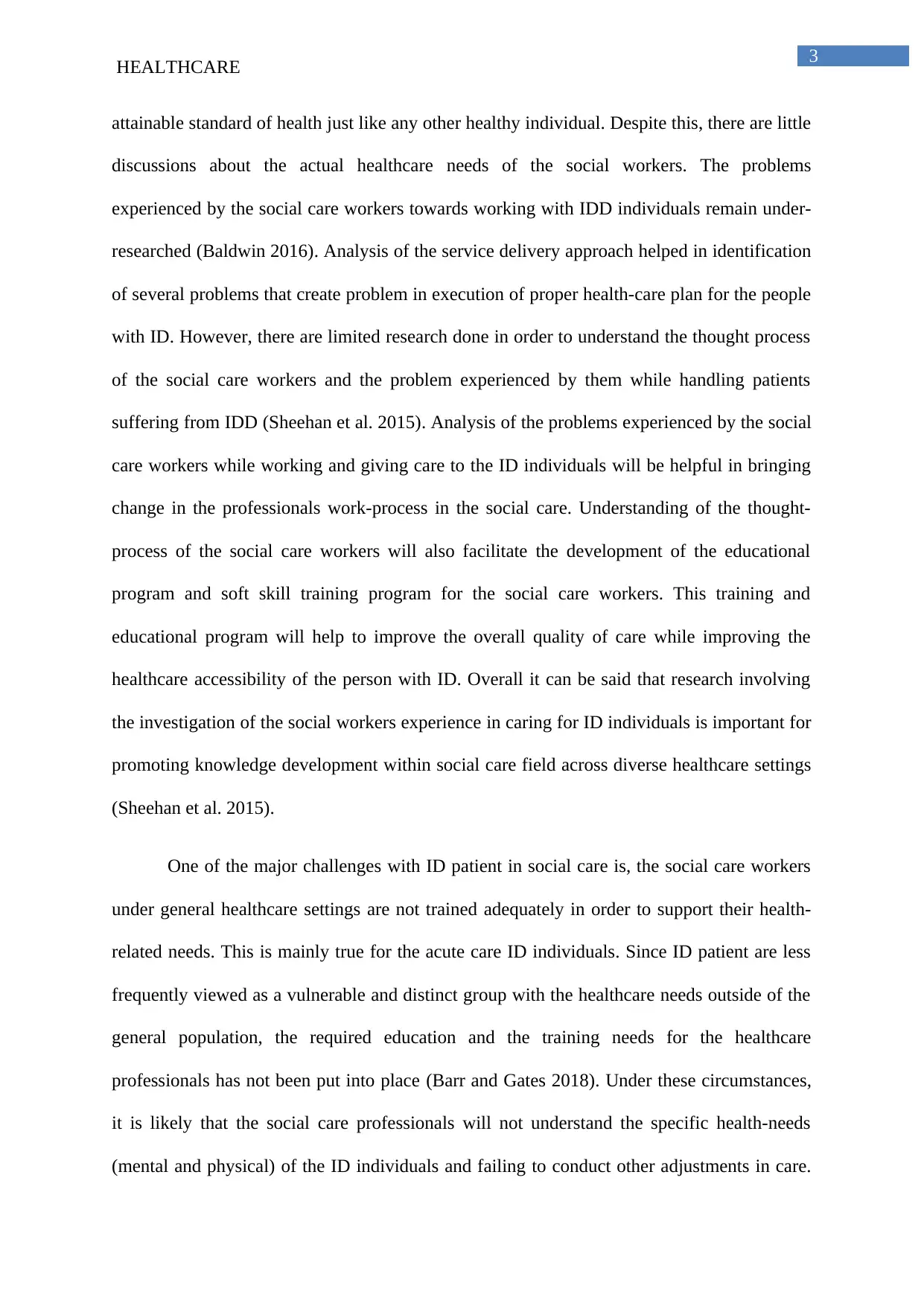
3
HEALTHCARE
attainable standard of health just like any other healthy individual. Despite this, there are little
discussions about the actual healthcare needs of the social workers. The problems
experienced by the social care workers towards working with IDD individuals remain under-
researched (Baldwin 2016). Analysis of the service delivery approach helped in identification
of several problems that create problem in execution of proper health-care plan for the people
with ID. However, there are limited research done in order to understand the thought process
of the social care workers and the problem experienced by them while handling patients
suffering from IDD (Sheehan et al. 2015). Analysis of the problems experienced by the social
care workers while working and giving care to the ID individuals will be helpful in bringing
change in the professionals work-process in the social care. Understanding of the thought-
process of the social care workers will also facilitate the development of the educational
program and soft skill training program for the social care workers. This training and
educational program will help to improve the overall quality of care while improving the
healthcare accessibility of the person with ID. Overall it can be said that research involving
the investigation of the social workers experience in caring for ID individuals is important for
promoting knowledge development within social care field across diverse healthcare settings
(Sheehan et al. 2015).
One of the major challenges with ID patient in social care is, the social care workers
under general healthcare settings are not trained adequately in order to support their health-
related needs. This is mainly true for the acute care ID individuals. Since ID patient are less
frequently viewed as a vulnerable and distinct group with the healthcare needs outside of the
general population, the required education and the training needs for the healthcare
professionals has not been put into place (Barr and Gates 2018). Under these circumstances,
it is likely that the social care professionals will not understand the specific health-needs
(mental and physical) of the ID individuals and failing to conduct other adjustments in care.
HEALTHCARE
attainable standard of health just like any other healthy individual. Despite this, there are little
discussions about the actual healthcare needs of the social workers. The problems
experienced by the social care workers towards working with IDD individuals remain under-
researched (Baldwin 2016). Analysis of the service delivery approach helped in identification
of several problems that create problem in execution of proper health-care plan for the people
with ID. However, there are limited research done in order to understand the thought process
of the social care workers and the problem experienced by them while handling patients
suffering from IDD (Sheehan et al. 2015). Analysis of the problems experienced by the social
care workers while working and giving care to the ID individuals will be helpful in bringing
change in the professionals work-process in the social care. Understanding of the thought-
process of the social care workers will also facilitate the development of the educational
program and soft skill training program for the social care workers. This training and
educational program will help to improve the overall quality of care while improving the
healthcare accessibility of the person with ID. Overall it can be said that research involving
the investigation of the social workers experience in caring for ID individuals is important for
promoting knowledge development within social care field across diverse healthcare settings
(Sheehan et al. 2015).
One of the major challenges with ID patient in social care is, the social care workers
under general healthcare settings are not trained adequately in order to support their health-
related needs. This is mainly true for the acute care ID individuals. Since ID patient are less
frequently viewed as a vulnerable and distinct group with the healthcare needs outside of the
general population, the required education and the training needs for the healthcare
professionals has not been put into place (Barr and Gates 2018). Under these circumstances,
it is likely that the social care professionals will not understand the specific health-needs
(mental and physical) of the ID individuals and failing to conduct other adjustments in care.
Paraphrase This Document
Need a fresh take? Get an instant paraphrase of this document with our AI Paraphraser

4
HEALTHCARE
Thus conduction of this research in order to analyse the challenges faced by the social-care
workers while working with adults having intellectual disability (ID) will be helpful in proper
designing of the service delivery proper in social care for ID individuals. Improvement in the
service delivery will help in improving the quality of life of the ID individuals and at the
same will help to reduce the overall cost of care (Barr and Gates 2018). A qualitative research
based on semi-structured interview with open-ended questionnaire will be conducted in order
to collect data aligning with the research objectives.
HEALTHCARE
Thus conduction of this research in order to analyse the challenges faced by the social-care
workers while working with adults having intellectual disability (ID) will be helpful in proper
designing of the service delivery proper in social care for ID individuals. Improvement in the
service delivery will help in improving the quality of life of the ID individuals and at the
same will help to reduce the overall cost of care (Barr and Gates 2018). A qualitative research
based on semi-structured interview with open-ended questionnaire will be conducted in order
to collect data aligning with the research objectives.
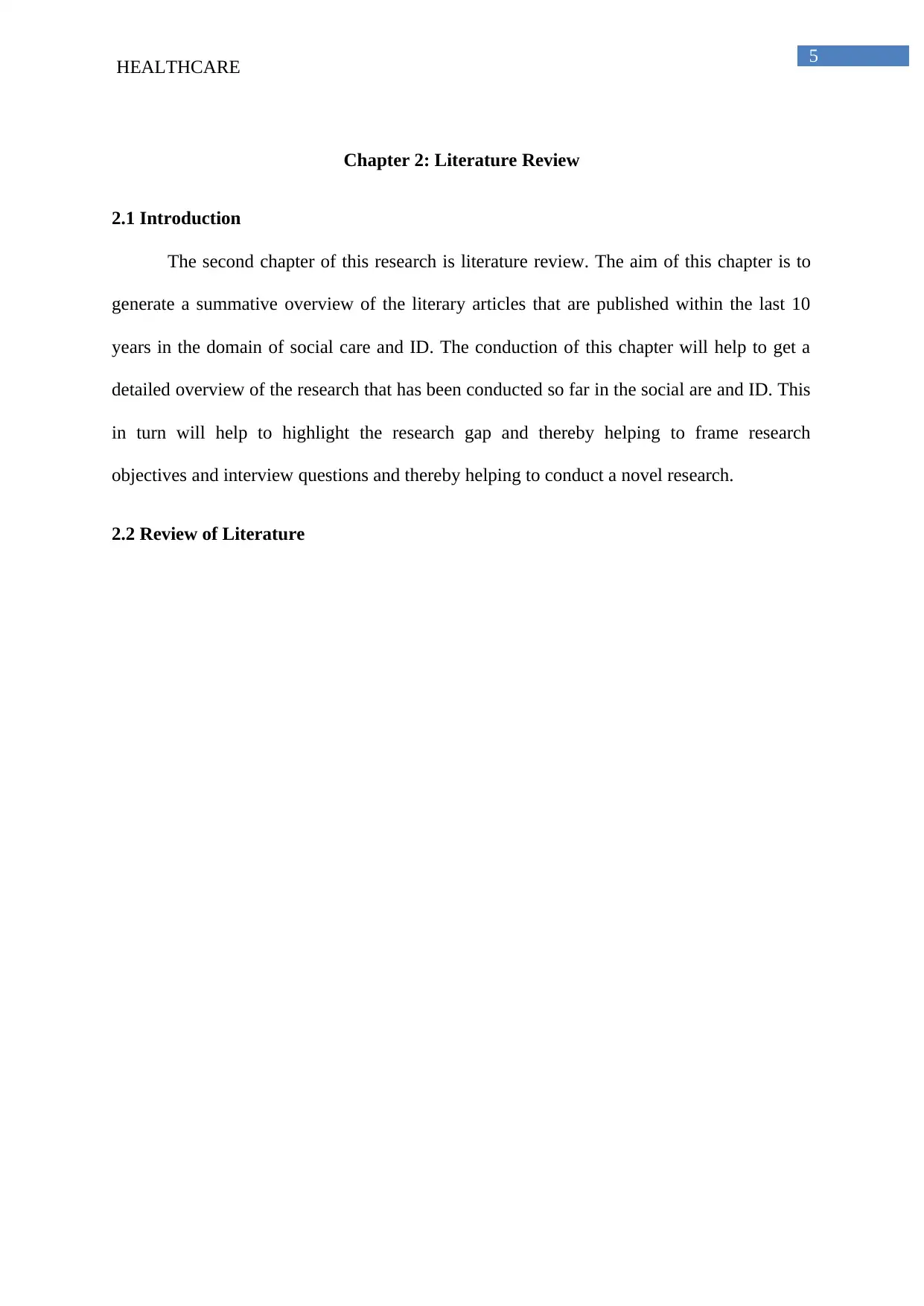
5
HEALTHCARE
Chapter 2: Literature Review
2.1 Introduction
The second chapter of this research is literature review. The aim of this chapter is to
generate a summative overview of the literary articles that are published within the last 10
years in the domain of social care and ID. The conduction of this chapter will help to get a
detailed overview of the research that has been conducted so far in the social are and ID. This
in turn will help to highlight the research gap and thereby helping to frame research
objectives and interview questions and thereby helping to conduct a novel research.
2.2 Review of Literature
HEALTHCARE
Chapter 2: Literature Review
2.1 Introduction
The second chapter of this research is literature review. The aim of this chapter is to
generate a summative overview of the literary articles that are published within the last 10
years in the domain of social care and ID. The conduction of this chapter will help to get a
detailed overview of the research that has been conducted so far in the social are and ID. This
in turn will help to highlight the research gap and thereby helping to frame research
objectives and interview questions and thereby helping to conduct a novel research.
2.2 Review of Literature
⊘ This is a preview!⊘
Do you want full access?
Subscribe today to unlock all pages.

Trusted by 1+ million students worldwide
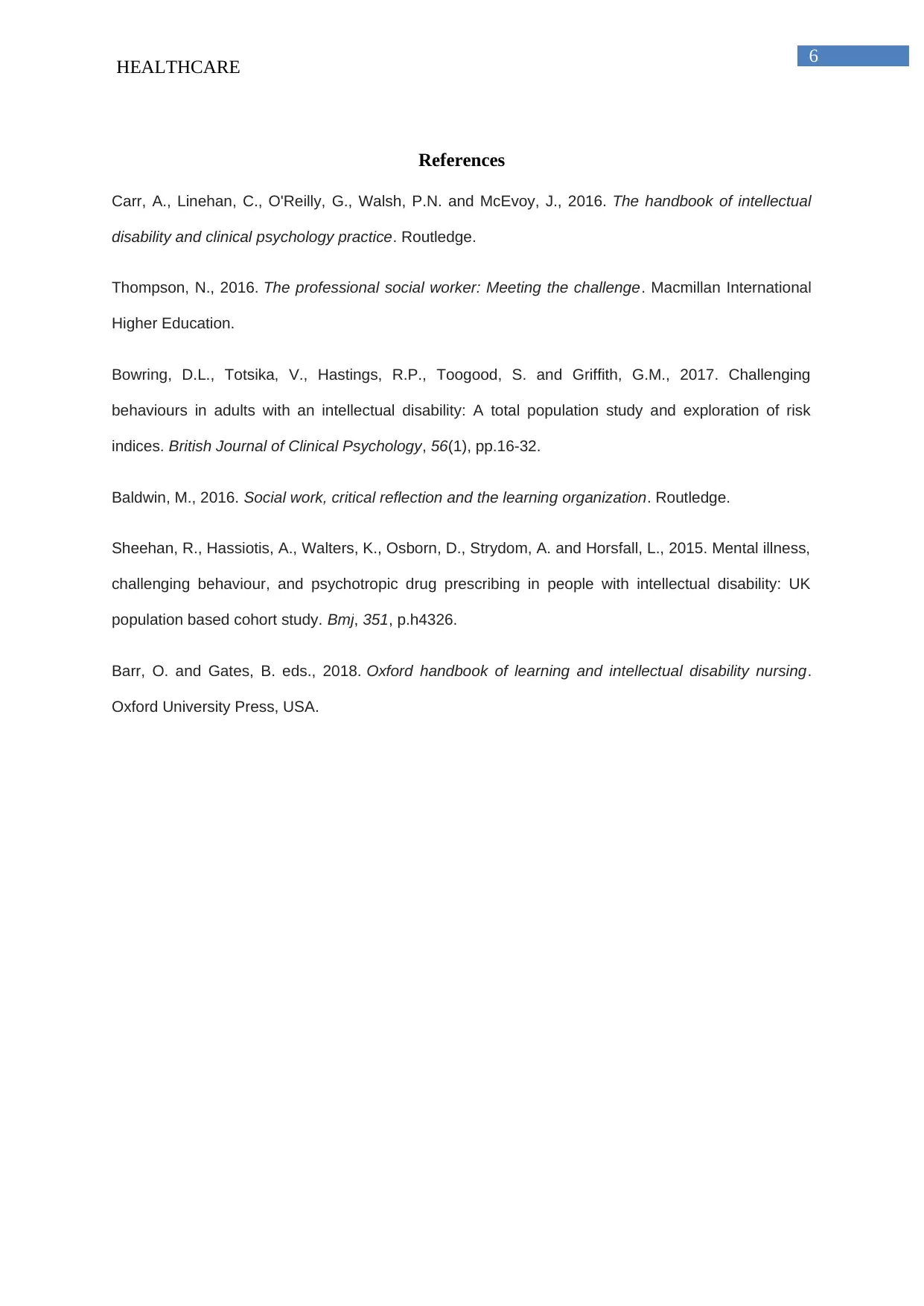
6
HEALTHCARE
References
Carr, A., Linehan, C., O'Reilly, G., Walsh, P.N. and McEvoy, J., 2016. The handbook of intellectual
disability and clinical psychology practice. Routledge.
Thompson, N., 2016. The professional social worker: Meeting the challenge. Macmillan International
Higher Education.
Bowring, D.L., Totsika, V., Hastings, R.P., Toogood, S. and Griffith, G.M., 2017. Challenging
behaviours in adults with an intellectual disability: A total population study and exploration of risk
indices. British Journal of Clinical Psychology, 56(1), pp.16-32.
Baldwin, M., 2016. Social work, critical reflection and the learning organization. Routledge.
Sheehan, R., Hassiotis, A., Walters, K., Osborn, D., Strydom, A. and Horsfall, L., 2015. Mental illness,
challenging behaviour, and psychotropic drug prescribing in people with intellectual disability: UK
population based cohort study. Bmj, 351, p.h4326.
Barr, O. and Gates, B. eds., 2018. Oxford handbook of learning and intellectual disability nursing.
Oxford University Press, USA.
HEALTHCARE
References
Carr, A., Linehan, C., O'Reilly, G., Walsh, P.N. and McEvoy, J., 2016. The handbook of intellectual
disability and clinical psychology practice. Routledge.
Thompson, N., 2016. The professional social worker: Meeting the challenge. Macmillan International
Higher Education.
Bowring, D.L., Totsika, V., Hastings, R.P., Toogood, S. and Griffith, G.M., 2017. Challenging
behaviours in adults with an intellectual disability: A total population study and exploration of risk
indices. British Journal of Clinical Psychology, 56(1), pp.16-32.
Baldwin, M., 2016. Social work, critical reflection and the learning organization. Routledge.
Sheehan, R., Hassiotis, A., Walters, K., Osborn, D., Strydom, A. and Horsfall, L., 2015. Mental illness,
challenging behaviour, and psychotropic drug prescribing in people with intellectual disability: UK
population based cohort study. Bmj, 351, p.h4326.
Barr, O. and Gates, B. eds., 2018. Oxford handbook of learning and intellectual disability nursing.
Oxford University Press, USA.
1 out of 7
Related Documents
Your All-in-One AI-Powered Toolkit for Academic Success.
+13062052269
info@desklib.com
Available 24*7 on WhatsApp / Email
![[object Object]](/_next/static/media/star-bottom.7253800d.svg)
Unlock your academic potential
Copyright © 2020–2026 A2Z Services. All Rights Reserved. Developed and managed by ZUCOL.





